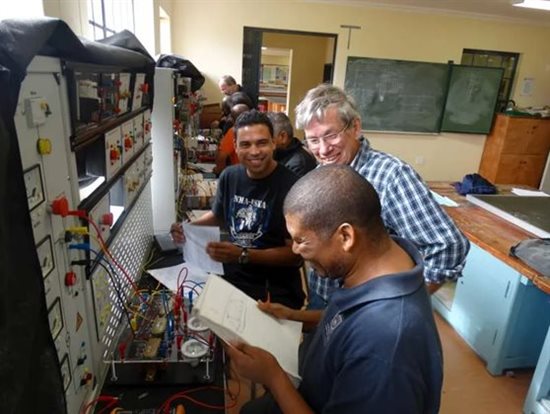Over in the US and up in Britain, political debates are raging between the Republicans and Democrats and the Conservatives and Labour. Mostly, this consists of vaguely relevant, highly personal slurs.
Occasionally, they actually discuss their policies and ideas. The left says business is cruel and privileged and causes environmental and social devastation. The right says that government is bloated and corrupt and is causing an economic and competitive decline. Of course, there are very few rational discussions on the merits of each sector, nor the best forms of collaboration and cooperation. This does happen, though, whatever the politicians may argue, and a good recent example is in the technical high schools of the Western Cape.
There are over 20 technical high schools in the Western Cape, ranging from Vredenburg to George, and they have over 30 years worth of PERT Electrical Training Equipment. Almost all of it is working and up to date. That is very unusual in technical education and training.
Generally things get purchased in large, expensive batches, get used for a short while, and then are discarded for a new, even more expensive system. But in the Western Cape there has been a lot of interplay between the education department and PERT to maintain the old and incorporate the new. Government tends to be good at co-ordinating and centralising, whereas business can more easily adapt and make quick adjustments.
Think of it this way: say there is a 1995 workstation with a faulty key-switch in a lab in Oudtshoorn. A new part costs a few hundred bucks (looks a little different but fits) and takes a technician about 20 minutes to replace. But the busy technician is up in Johannesburg and the old double sided PERT workstation is 2m tall and very heavy. Do you see the problem?
It is basically a cheap, easy repair but circumstances make it prohibitively expensive. However, the department does have their advisors visiting the schools on a regular basis. If, during these visits, they can also get relevant technical info, the PERT technicians can source the parts and tools ahead of the next round. (We have had some of the same technicians for decades, so they can repair vintage.)
This means PERT can usually service for free. Similarly with teacher training workshops. If the department co-ordinates with the teachers and provides the venue, PERT can provide the instructor at a comparatively small cost. Over the last few years in the Western Cape, PERT has repaired and serviced dozens of machines and provided multiple days of hands-on training at absolutely no charge. This would never have been possible without excellent co-ordination and consistent communication from the local department of education.
I have been in this business of technical education and training for nearly 30 years. In that time I have seen many players come and go and have evaluated equipment from every continent and every decade. I think I can say quite sincerely that all elements considered: price, quality, curriculum, training and support, the Western Cape schools have probably had the best deal to be had, anywhere in the world. This is because we are awesome (obviously).
But joking aside, this sort of thing happens when the public and private sectors communicate well and play to their strengths. And that continues to happen, in spite of the divisive rhetoric, and heated arguments of politicians up for re-election.

















































